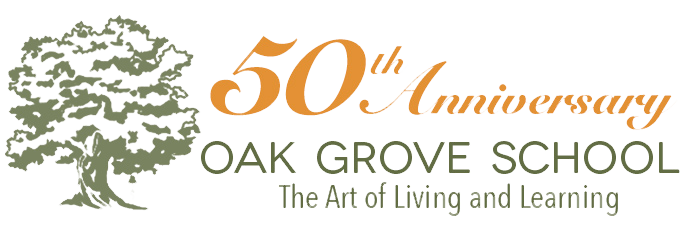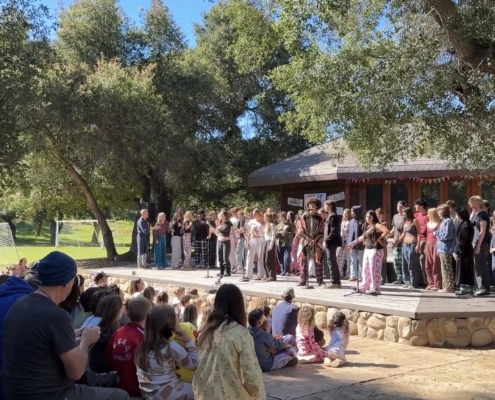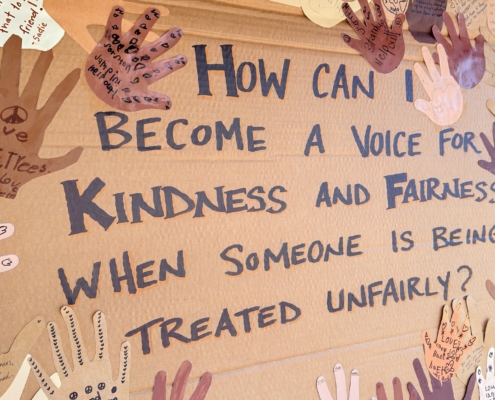DEIB COMMITTEE
Creating an inclusive, welcoming environment for all members of the school community
Oak Grove’s committee for Diversity, Equity, Inclusion, and Belonging (DEIB) welcomes new and returning members to learn together and to shape our hopes for the school year.
Last year, the DEIB Committee created two affinity groups – the People of Color Affinity Group and the White Ally Group – discussion groups which met monthly to share provocative readings and reflection, with the goal of unpacking our own histories, assumptions, biases, and learning. These two groups will continue to meet this year, with joint meetings scheduled periodically, to connect and reconnect through sharing ideas, stories, resources, information, and awareness of how our own identities and experiences shape perspectives we hold. Sessions focus on equity, inclusion, belonging, and diversity, including intersectionality of race, gender/sexuality, neurodiversity, family structure, socioeconomic, and other differences.
Parenting adults may sign up for an affinity group on ParentSquare, making a commitment to participating for the school year. Dates, times, and locations will be published, and we invite everyone to join in for inspiration, learning, and connection. For questions, see FAQ below.
Our work as a DEIB committee is rooted in creating an inclusive, welcoming environment for all members of the school community and in listening and asking questions, to learn from and about one another. We understand that an essential responsibility of educators and parenting adults is to foster in children a positive self-identity, empathetic interaction with people from diverse backgrounds, and the skills to recognize and address bias and prejudice through awareness and personal action. We adults need to be able to respond to students’ concerns and, even without waiting for children to ask questions, to initiate age-appropriate, supportive activities and discussions. We also need to help students learn to stand up for themselves and others in the face of discriminatory actions, and for older students, to navigate these challenging times through learning strategies for following breaking news responsibly, processing the escalation of conflicts in the wider world, and taking care of themselves and others emotionally.
Currently, our anguish at yet more violence, war, and government rancor magnifies the importance of this work. DEIB work emphasizes guarding time for the profound and long-term inward work needed for each of us to come to terms with our own feelings, attitudes, and behaviors towards people different from ourselves, and to integrate an anti-bias lens into our teaching and parenting so that we’re better prepared to nurture students’ growth.
Integrating an anti-bias perspective is a school-wide commitment to fostering positive relationships in a world full of division. According to the Anti-Defamation League,
“Anti-bias education is an approach to teaching and learning designed to increase understanding of differences and their value to a respectful and civil society and to actively challenge bias, stereotyping, and all forms of discrimination in schools and communities. It incorporates an inclusive curriculum that reflects diverse experiences and perspectives, instructional methods that advance all students’ learning, and strategies to create and sustain safe, inclusive, and respectful learning communities.
“A basic tenet of anti-bias education states that bias is learned. From their earliest days of life, children receive messages about their own identity and the identities of others. These messages are often subtle and learned unconsciously – from family, friends, school, and the media – but they can have a lasting impact on people’s self-image and worldview. When diversity (differences based on race, religion, gender identity, sexual orientation, language, culture, learning style, age, socioeconomic class, family structure, body type and ability) is not valued or respected, harmful behaviors like name-calling, bullying, and social exclusion can emerge.”
At Oak Grove we are committed to taking a systemic, proactive approach that integrates anti-bias principles into all aspects of our culture, policies, and pedagogy, including:
- Anti-bias curriculum and resources for teachers in preschool through high school, used as an underpinning perspective which permeates the educational program.
- Staff professional development in bias awareness, anti-bias education, and social-emotional learning.
- Student leadership training and opportunities to develop ally behaviors.
- Educational forums and community events for all parenting adults.
- Ongoing, school-wide commitment to promoting a culture of respect, inclusion, and belonging.
Differences do not create bias. Children learn prejudice from prejudice – not from learning about human diversity. It is how people respond to differences that teaches bias and fear.
-National Association for the Education of Young Children
Oak Grove School Affinity Group FAQ
What is an affinity group?
Affinity groups are organized around shared identities and experiences. These identities can include race, gender, religion, or other social identifiers. They provide safe spaces where group members can reflect on their experiences without having to explain, defend, or educate constantly.
In school communities, affinity groups can foster connection, community, and confidence.
From Learning for Justice – Allyship: Refusing to remain silent in the face of discrimination; speaking up when we hear slurs and biased speech; learning about the history of systemic racism in the US to better understand how we got to where we are today; simply denouncing racism isn’t enough: carefully considering how our “privilege” intersects with someone else’s oppression; looking inside ourselves for hidden biases: educating ourselves on hidden biases.
How did affinity groups come to be at OGS?
Affinity groups came out of requests from parenting adults of color who wanted a safe space to build community and explore challenging issues without having to explain or educate others on their perspectives.
Beginning in Fall 2024, the White Anti-Racist Ally Group and the BIPOC Parenting Adult Group were launched to foster inclusivity and awareness around issues of bias, equity, and diversity at Oak Grove School.
What do affinity groups do at OGS?
These groups create space for learning, inquiry, and community-building.
Affinity groups are a place for parents to learn and clarify what they need to support their children through challenging topics and experiences.
Affinity groups do not create school policy. However, if ideas or suggestions emerge, members are encouraged to share these with the DEIB Steering Committee for consideration by OGS administrators.
What is the DEIB Steering Committee?
The role of the DEIB Steering Committee is to provide leadership and direction based on long-term strategic planning. Designated parents and staff members facilitate each of the two affinity groups. A staff member facilitates the high school LGBTQ+ student/staff affinity group. Joined by the Head of School, the Steering Committee serves in an advisory capacity, committed to their responsibility to shepherd the school community in reaching its short- and long-term goals.







